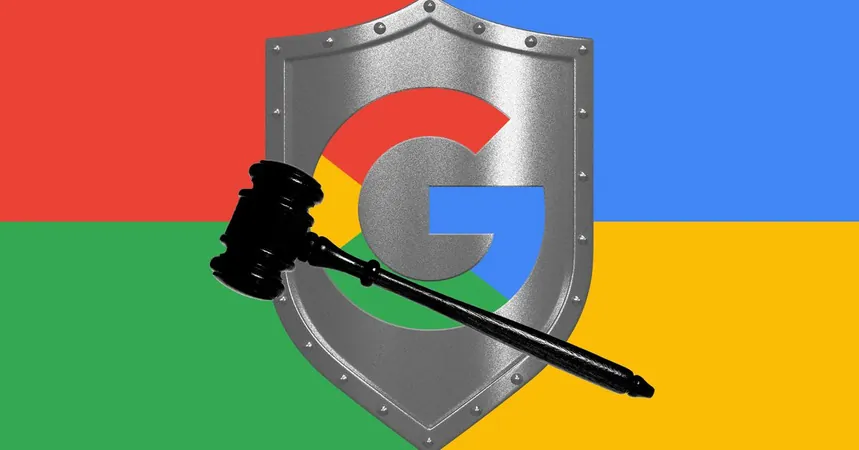
Google Fires Back at DOJ: A Bid to Preserve Chrome while Saying Goodbye to Its Apple Deal!
2024-12-23
Author: Wei
Introduction
In a dramatic twist amidst ongoing antitrust battles, Google is facing a significant ultimatum from the Department of Justice (DOJ) following its earlier court defeat over monopolistic practices in the online search market. The DOJ has outlined a sweeping set of changes aimed at reshaping Google's search business, which has provided the tech giant with another curveball. The agency's demands include the potential sale of its Chrome browser, the syndication of search results, and an end to exclusive agreements with companies like Apple for default search placements. Surprisingly, the government even hinted at a possible divestment of Android!
Google's Response
In response, Google has proposed a simpler remedy: a ban on default placement arrangements – but for a limited window of just three years. This comes in the wake of a court ruling that deemed Google liable for unlawfully monopolizing the online search landscape, effectively calling for reforms that would encourage fair competition from rival search engines.
Contesting Monopoly Claims
Google staunchly rejects the notion that it operates a monopoly. However, in a tactical move to dampen potential impacts from an unfavorable judgment, the company is attempting to contain the fallout. The tech titan argues that default search deals were at the heart of the antitrust case and thus should be the focal point for judicial action. Under this new proposal, Google would be barred from striking deals with Android manufacturers that tie mobile search access to the inclusion of other Google services. This means that smartphone makers would be free to promote competing search engines and browsers without restriction.
End of the Apple Deal
One of the most significant concessions in Google's counterproposal would see the end of its lucrative, multi-billion dollar search deal with Apple. According to the new terms, Google would lose the ability to have its search engine pre-installed as the default option on "proprietary Apple features or functionalities," such as Siri and Spotlight, unless Apple is granted the flexibility to switch to different default search engines and promote them within its platforms.
Addressing AI Concerns
In a nod to contemporary concerns regarding competition from AI-driven search alternatives, Google’s plan also addresses the DOJ's worries about restricting access to rival search tools. The company proposes that phone makers would not be required to include Google’s Gemini Assistant mobile app to access other Google services.
Duration of Changes
While the government is advocating for ten years of restrictions to recalibrate the playing field, Google asserts that just three years of changes are sufficient. The company argues that the rapid evolution of search technology makes long-term regulation unnecessary and potentially harmful to innovation.
Potential Outcomes
If the court sides with Google’s streamlined proposal instead of the DOJ’s broader demands, the company will weather the storm without having to sever ties with its Chrome browser or face a potential Android spinoff. Additionally, Google would retain control over critical algorithms that optimize search results and keep rivals at bay.
Implications for Competitors
Both sets of proposals serve as foundational starting points for the judge’s upcoming deliberations, but Google hopes to frame its path forward as a practical solution to a very specific issue laid out during the trial. The tech giant paints the DOJ's requests as extreme overreach, hinting at a successful appeal should the government's conditions be implemented.
Feedback from Competitors
This latest move by Google has not been well-received by competitors, including DuckDuckGo, which has expressed concerns regarding the effectiveness of Google's proposal. Spokesperson Kamyl Bazbaz stated that it seems aimed at preserving the status quo while minimizing necessary changes.
Conclusion
As this high-stakes saga unfolds, both parties are set to present their cases in a federal court in Washington, D.C., starting April 22. Will Google successfully fend off major changes, or is this just the beginning of a new chapter? Stay tuned!

 Brasil (PT)
Brasil (PT)
 Canada (EN)
Canada (EN)
 Chile (ES)
Chile (ES)
 España (ES)
España (ES)
 France (FR)
France (FR)
 Hong Kong (EN)
Hong Kong (EN)
 Italia (IT)
Italia (IT)
 日本 (JA)
日本 (JA)
 Magyarország (HU)
Magyarország (HU)
 Norge (NO)
Norge (NO)
 Polska (PL)
Polska (PL)
 Schweiz (DE)
Schweiz (DE)
 Singapore (EN)
Singapore (EN)
 Sverige (SV)
Sverige (SV)
 Suomi (FI)
Suomi (FI)
 Türkiye (TR)
Türkiye (TR)